FAQ
SECTION 1: SURFING THE LAKES
How can one surf on the Great Lakes?
Given that waves, produced by strong winds and dense air, occur on the lakes throughout the year, the only requirements/limits to surfing here are a) having the appropriate equipment (see part 4), and b) knowing when waves happen/where to go. Equipment means a wetsuit, needed for warmth, and a device to surf with. Equipped with a flexible schedule, and access to driving, a diligent surfer could be out 3 times a week between September and April (peak months (see part 3)).
You mean windsurfing? Or wakesurfing behind a boat?
Standard, or “prone,” surfing typically means standing-riding swell that breaks on an underwater surface shallow enough to cause its collapse (where it becomes a wave). There are various boards and means of riding, but surfing generally suggests paddling in (accelerating the board so that the wave grabs it) and then standing up, riding laterally along the breaking pulse of water. Whereas other watersports can include or encompass surfing (e.g. windsurfers can ride waves), surfing refers essentially to what happens on the wave.
Is there a best time of the year to surf here?
Our surf season starts late Summer/early Fall and goes all the way to mid/late Spring. Given that cold air is a key ingredient to surf here, Summer surfing is viable but inconsistent; Fall/Winter is prime. As a base algorithm, 30km/h+ winds maintained for at least 3-4 hours will generate swell. Air and water temperature play a key role: colder air (denser molecularly) imposes itself on warmer water (more malleable). The wider the dissonance between water temp and air temp, the more favourable the conditions are for swell to occur. Fall ends up housing the best conditions for swell, as well as winter and spring.
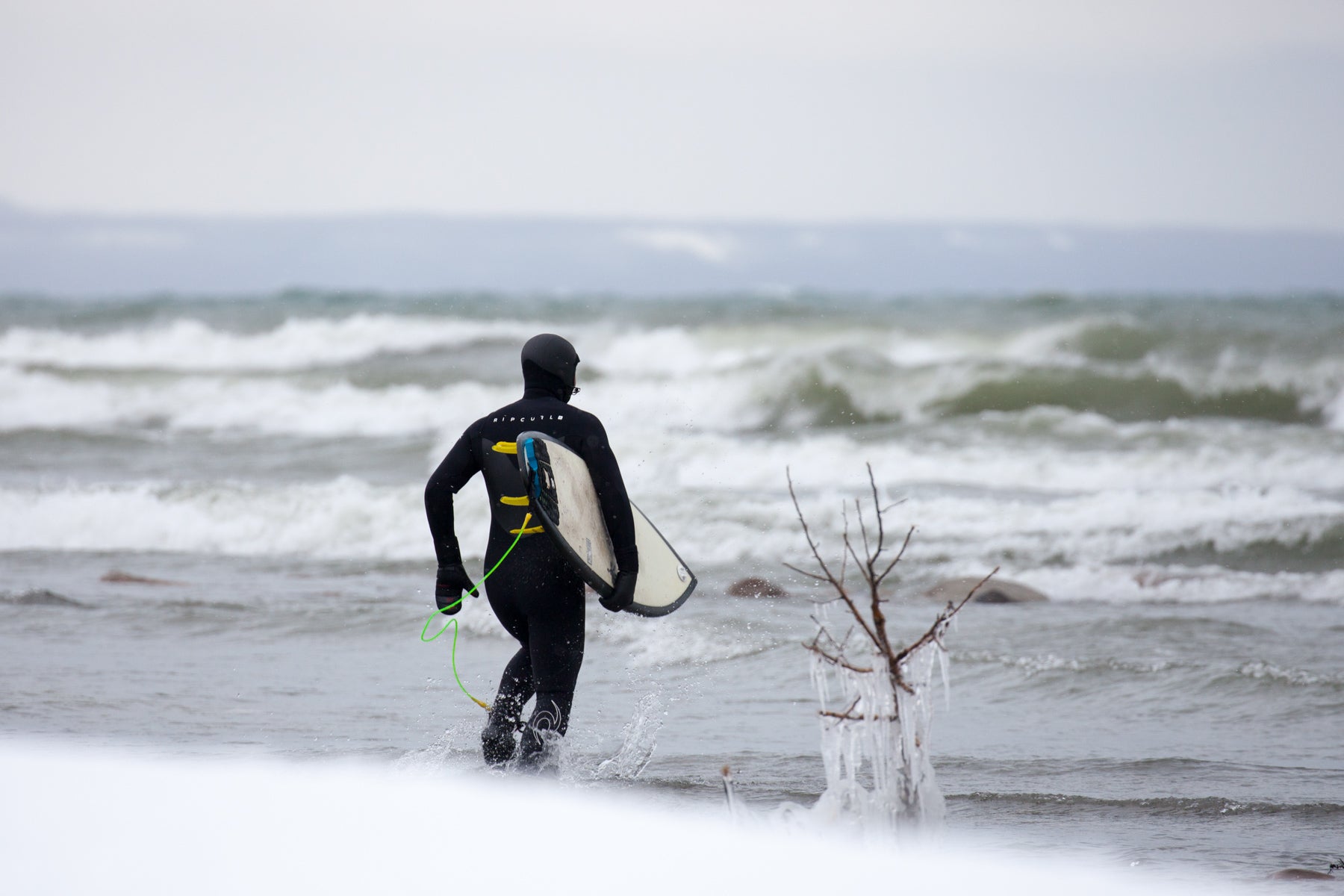
What kind of boards can I ride on the Great Lakes?
You can ride any and every board on the lake, but skill, rider size, and conditions will dictate what it is you do ride. Chief among factors is ensuring you have a board that will allow you to enjoy yourself and improve. It’s often noted that fresh water lacks the buoyancy of salinity, so foam-friendly, floatier surfboards are favoured. That being said, the gamut of wave riding devices seen used on the lakes varies. Talk with a Surf the Greats team member to make sure you’re on the right equipment for your surfing.
What thickness of wetsuit do I need to surf here?
Your wetsuit is the most important piece of equipment you own as a lake surfer. Generally speaking, November-April demand a thick suit (5/4 mm or 6/5 mm) paired with boots and mitts (5-7mm ea.). Summer months allow for thinner suits to be used (3/2-4/3mm). Your most economical option as a year round surfer is to purchase the thickest suit, and layer down when it’s called for (remove boots, gloves, hood). Click here the to see our extensive neoprene inventory.


How do I know when and where to surf here?
The best way to know when there will be waves is to follow our stories on Instagram. We also post detailed wave forecast reports to the 'Wave Rider Club'. This private group is moderated, open to anyone, and free to join.
The base algorithm for wind direction (indicating the direction the wind blows from):
Ontario West Side (Toronto, Hamilton): NE, E, SW
Erie East Side: SW, W
Huron East Side: N, NW, W
Georgian Bay South Side: NW, N, W
Using any local wind website will allow you to monitor the potential for swell: Sailflow, Windy, Ikitesurf, Weather Network, Surfradar.info, Lake Swell
To obtain a thorough understanding of forecasting, to know exactly where to go and when — sign up for our Forecasting Workshop which happens periodically once a month!
Our workshop covers:
• The science behind wave formation on the Lakes.
• Understanding weather maps and charts.
• Using online tools and apps available for wave forecasting.
• Introduction to the most established surf spots and the ideal conditions for each spot.
• Understanding the differences in conditions for each season.
• Overview of surfing and SUP equipments.
• Basic surfing etiquette.
• Basic safety and self rescue tools.
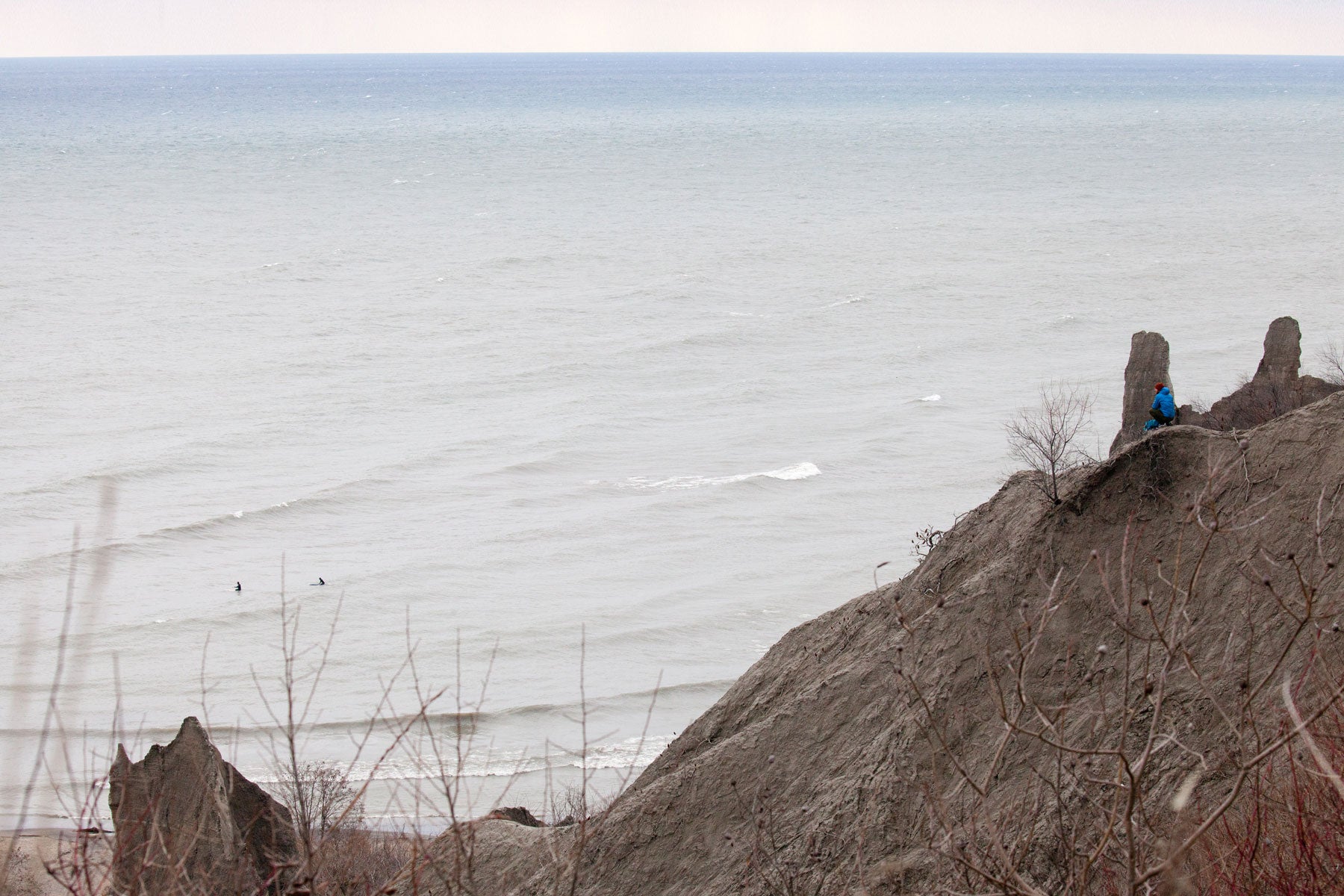
Can I use Surfline or Magic Seaweed for forecasting waves on the lakes?
Yes, but most forecasting websites fail to account for the nuance and volatility of swell generation on the lakes, so these websites can be unreliable. Cultivating a knowledge of the unique way surf works here is your best bet for forecasting here on the lakes.
What is the water quality like in Lake Ontario?
Generally speaking, Lake Ontario’s water is clean and safe for swimming. It’s important to know that bacteria levels are highest after storms/rain. Some surfers elect to use special earplugs to protect themselves. With that being said, health issues can be an issue. We work with local not-for-profit organizations such as the Lake Ontario Waterkeeper and Swim Drink Fish on beach cleanups and other environmental initiatives to protect and preserve the Great Lakes. We advise our community to swim and surf at their own risk and welcome any questions they may have about water quality here.
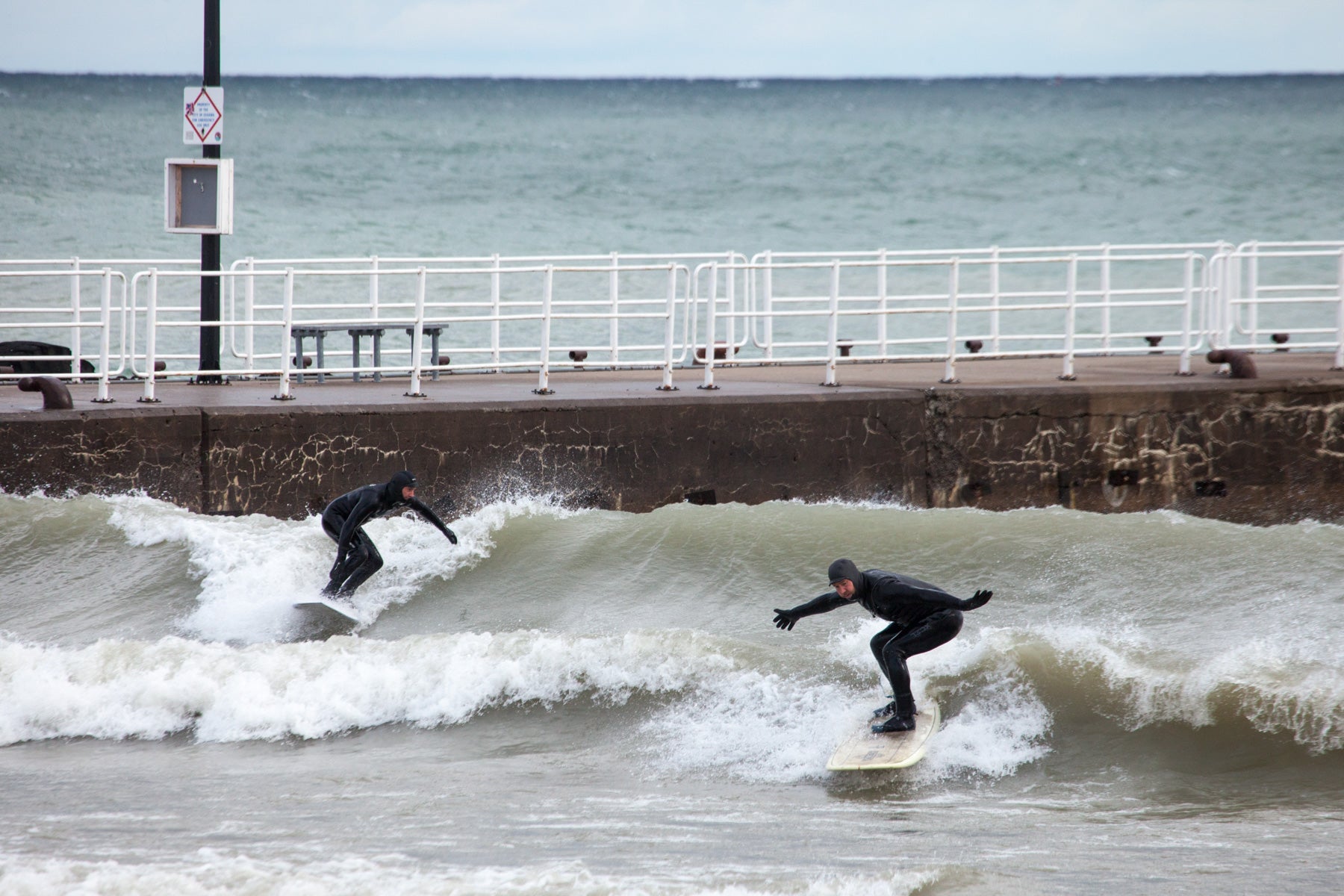
Is there an actual surf community here?
Indeed. The surf community on the lakes is accelerating in growth and bubbling with energy. This manifests in surf shops around the region, community events/gatherings, surf contests and events, and an influx and mingling of surf culture with the local arts scene.
Do you have any advice for anyone wanting to start surfing here?
If you come from ocean surfing, prepare to recalibrate your expectations. While the oceans undeniably provide cleaner, stronger, and more consistent conditions for surfing, lake surf possesses a uniqueness and intensity shaped by the entire experience. It would be reductive to merely call this “novelty” — uncrowded lineups, snowfall cleanup sessions, and hardy bonds between surfers are just some of the tangible wonders of surfing here.
Additionally, the waves here have the ability to improve your surfing by adapting you to variant and challenging conditions. In short, it provides you with a different eye for waves and an appreciation for the intricacies of navigating tumultuous conditions.
Lastly, be sure to inform yourself about the risks and consider taking a lesson to get started. Surfing here is a bit tricky and having someone guide you through the experience, teach you the basics in a safe environment, can be very beneficial.

How do people keep safe?
- Have the proper equipment
- If you are a beginner, we recommend starting with a soft top board
- Ensure you have the right wetsuit to keep you warm in the water (talk to us to verify that you’re using the right gear)
- Don’t be afraid to bring extra insulation, food, or a tea thermos to your surf spot with you. Practice the sport in a safe manner, we advise surfers to pick their spots according to their skill and comfort level
- Never surf alone
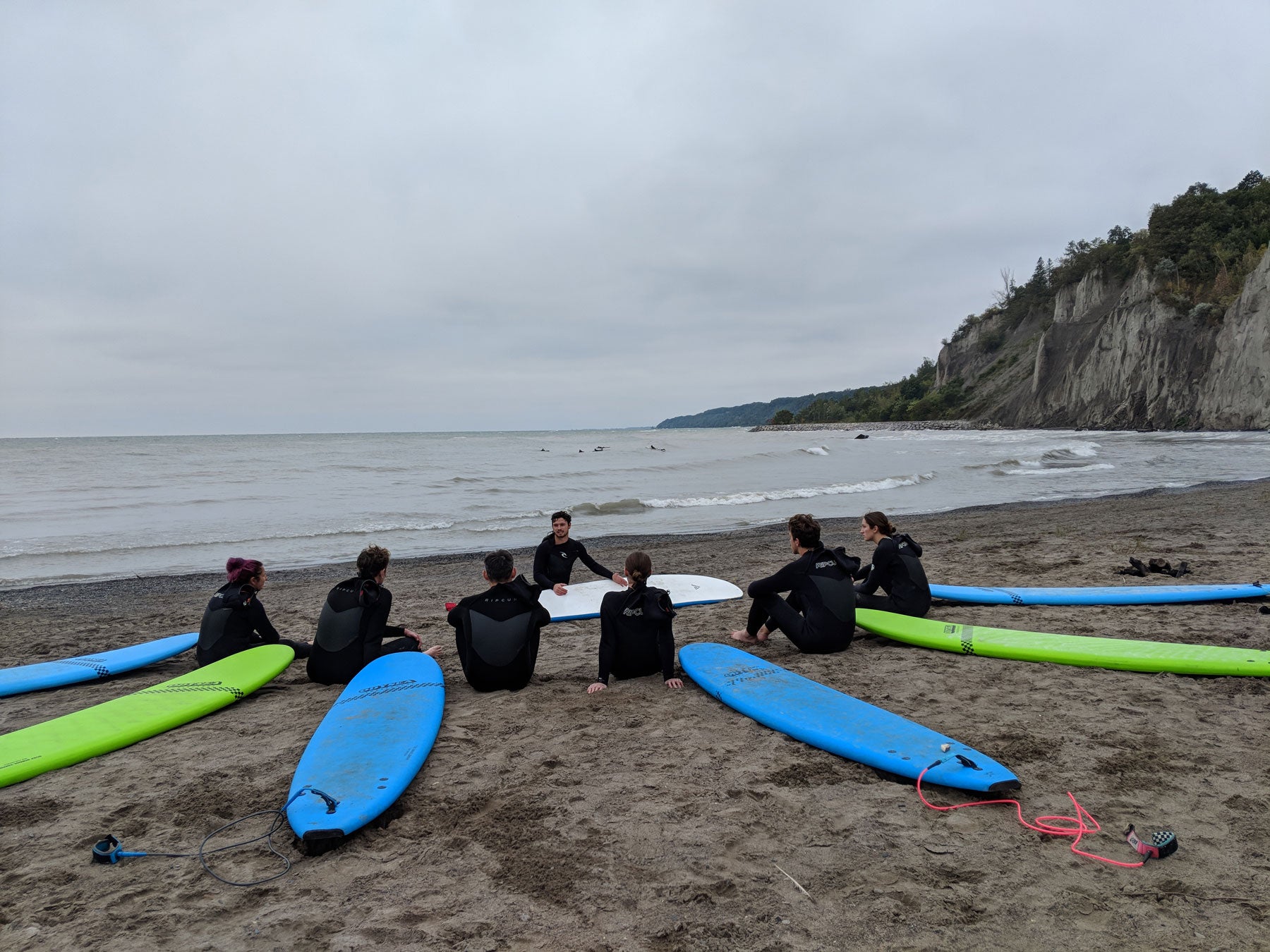
SECTION 2: Surf School
(The only surf school with ISA-certified instructors on the Greats)
Regularly, whenever there’s waves and the conditions are appropriate for teaching. This upcoming season we will strive to run as many lessons as possible — getting more beginners and intermediates out in the water learning!
How to sign up for a lesson?
Learning to surf on the Great Lakes is a challenging, yet exciting endeavour. Our conditions here tend to be a bit harsher than on the oceans and the lack of consistency in good waves to teach have forced us to adapt our coaching and our offerings through our surf school. We created our Flat Water Intro to Surf Clinics as pre-requisite for our surf lessons with waves, so you can learn all the techniques you will need to get out on the waves in a safe and welcoming environment. This program is designed for low wind days in a controlled setting, giving you the time to perfect the fundamental skills required for our surf lessons with waves. This clinic will take you through a theory and dry land lesson that begins like any surf lesson, from safety and conditions, the differences from ocean to lake and a detailed instruction proper surfing techniques. This includes paddling techniques, turtle rolling, popping-up, correct stance and more. And yes, we will get out on the water and put this to practice and to build the paddling strength, with our instructors right by your side helping you perfect these skills.
Can I book a lesson for a specific time and date?
Our Flat Water Intro to Surf Clinics happen on a set schedule. However, with the variant and highly unpredictable nature of lake surfing, we are unable to schedule surf lessons with waves specific times for lessons to take place. When we enter into a lesson's window (2–3 days advance), we send out an email to everyone who has previously taken our pre-requisite Flat Water Intro to Surf Clinic. Spots are booked on a first-come-first-served basis; the first people to pay online following the email will be signed up for that session.
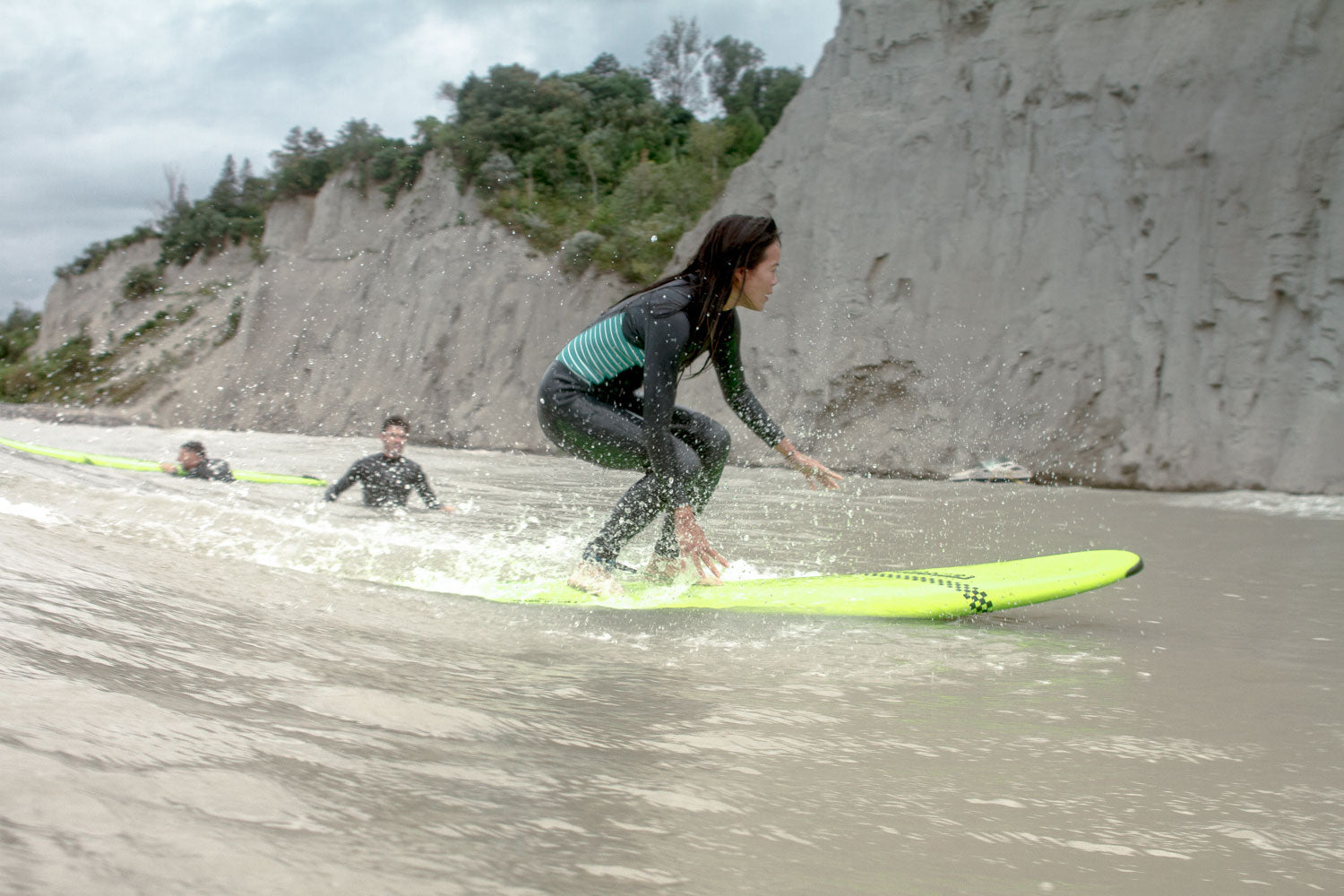
Yes, if you have surfed before or have taken a lesson before, you still need to take this pre-requisite clinic prior to taking a lesson with waves. Any surfer who wishes to skip the Flat Water Clinic prerequisite needs to prove they can tick all the items in our White Fin Surfing Skill Classification listed on our website. We will also require photographic or video documentation in support of your surfing ability and experience. You can send your documentation to us via email, and our coaches will analyze it and make a decision.
How can I book a Flat Water Intro to Surf Clinic?
Our clinics are available on a regular schedule from June until September. We offer private, semi-private and group clinics on a weekly basis and you can book them through our website as well as via email.
I've taken the Flat Water Pre-requisite, how can I book a lesson with waves?
Once you fulfill the pre-requisite for the lessons with waves, your email gets automatically added to our mailing list for lessons with waves. Whenever we are running lessons, we send out an email to that list within 1-3 days in advance. All the information you need to know about the class as well as instructions on how to sign up will be included in the email. Just keep an eye on your email and when there is a lesson that works with your availability, we recommend booking right away as our lessons book up quickly.
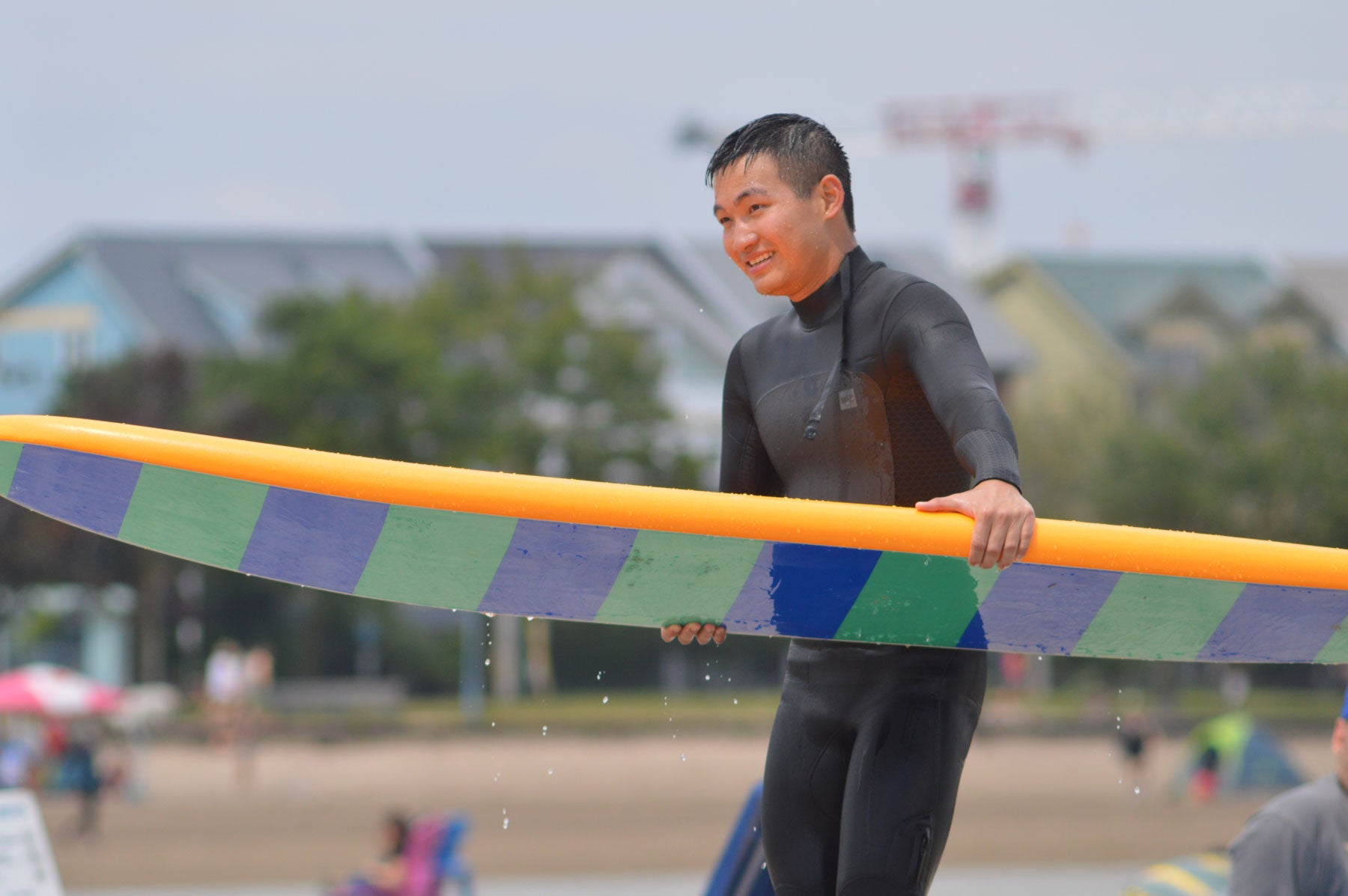
All of our beginner/intermediate lessons are run between March and December, as we don’t conduct lessons when the temperature drops to freezing or below. The exception to this is guided intermediate/advanced surfing lessons which are sometimes run during the winter months.
Part of the experience we offer, regarding surf lessons, is the guarantee that our students are well taken care of. That’s why we follow a strict 1-3 ratio (teachers-students) in order to conduct the lessons properly. Part of this includes our equipment: we carry gear (neoprene) that will ensure the comfort and warmth of students at the time of year the lessons are run.
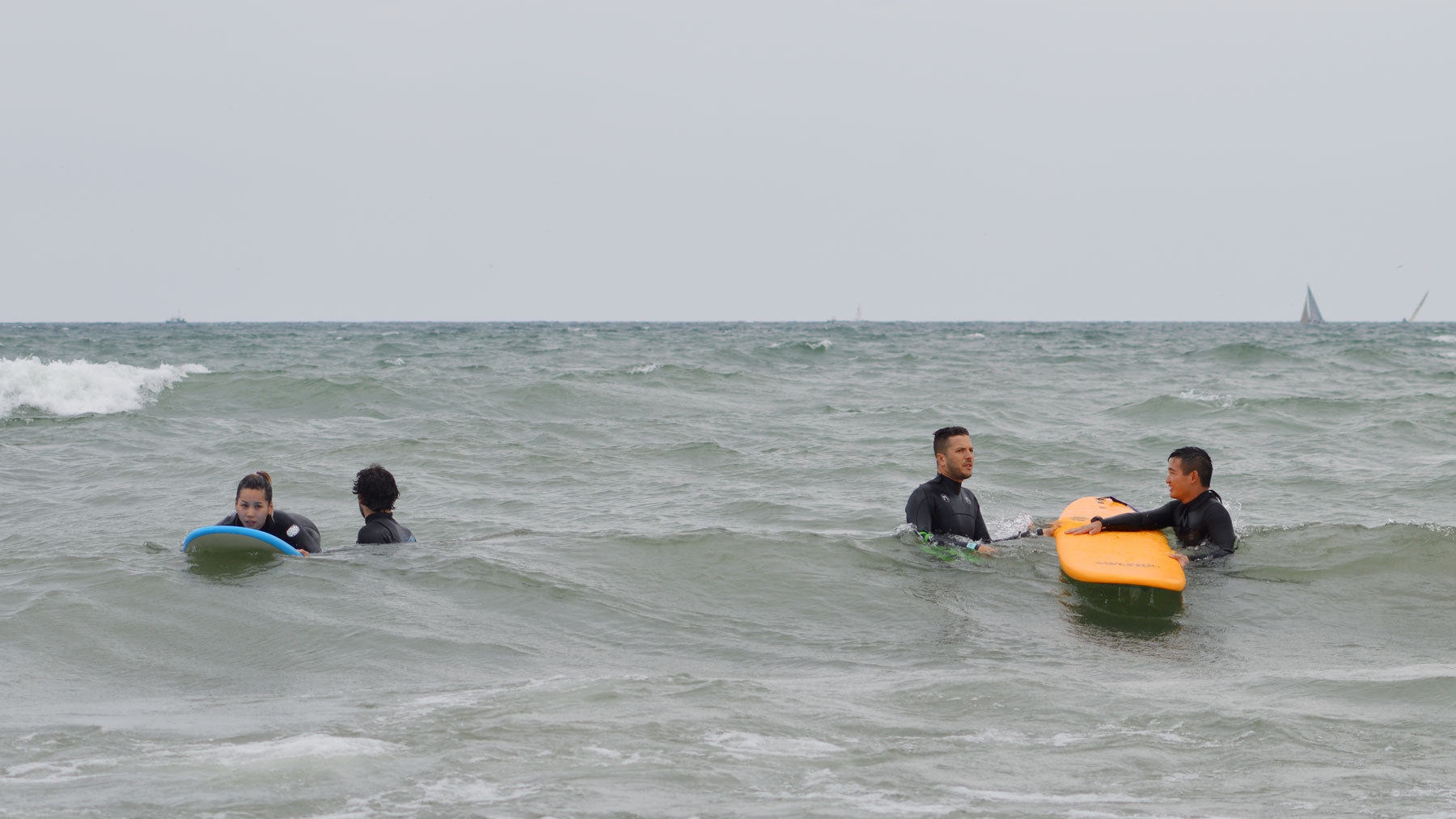
Each of our instructors are certified by the International Surfing Association. That means the ISA methods and standards of teaching, communication and safety are part of the experience with Surf the Greats lessons. We are the only school in Ontario that offers training of this caliber.







